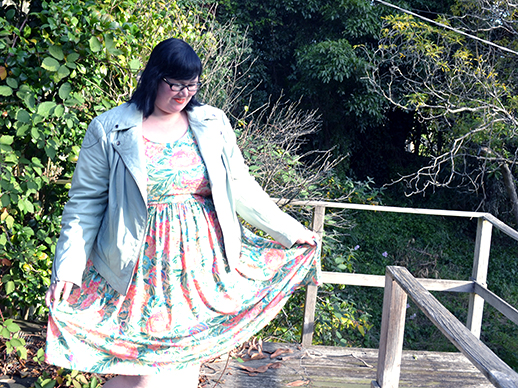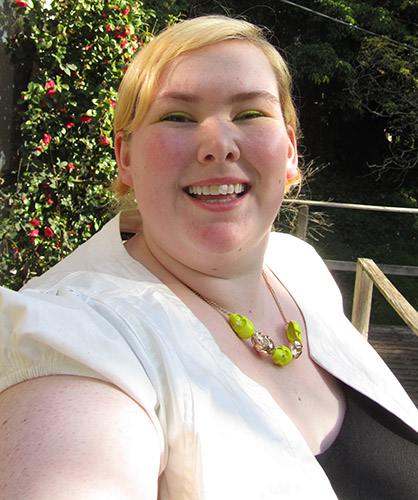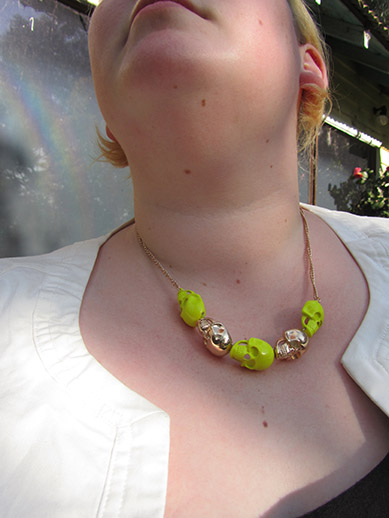
A slightly overexposed photo of me with short black hair. I’m standing outside in a leafy environment, wearing an orange and green floral dress and a mint green leather jacket, smiling down at the skirt I am holding out to either side. I’m wearing glasses and orange lipstick too.
It’s Fatshion February! A month where the fat blogosphere focuses on clothes, not just pretty photos (although there are lots of those and they are delightful) but thoughtful discussions about beauty culture, clothing access and other social justice issues that relate to fat people clothing ourselves. I freaking love it.
A quote from Melissa McEwan’s recent Shakesville post on fat fashion has been making the rounds of tumblr and it’s had me nodding my head every time I see it go past. I recommend you go read the whole post (and the one about high heels linked therein that the quote actually comes from!) but here’s a teaser:
For fat women, being stylish isn’t a luxury. It’s often a necessity to get hired, to get access to healthcare, to get treated like a human being.
Fat women have all kinds of narratives about sloppiness, laziness, dirtiness to overcome. Sometimes heels are a crucial part of looking “put together” in a way that sufficiently convinces people that we care about ourselves, that manages to counteract pervasive cultural narratives that fat people don’t care about ourselves. That we have “let ourselves go.”
Being “put together” is part of the way many of us convey to a judgmental world that we are worth caring about.
It’s undoubtedly true that all women are expected to put more effort into their appearance than men in order to be taken seriously (and that submitting to these cultural requirements is ALSO used against us as evidence that we are superficial and obsessed with appearances). But I feel the pressure to look “put together” very keenly as a fat woman, and it’s different as a very fat woman than it was when I was smaller. I don’t always feel compelled to dress up, but I do have a far less casual everyday wardrobe than some of my friends. And when I do feel compelled to go the full fatshionista – makeup, styled hair, accessories and so on – it’s usually because I feel vulnerable in the situation I’m going into and I need the additional defence of looking well-dressed.
Reading Melissa’s post, I was reminded of an experience I had several years ago when I was complaining about the trouble I had buying clothes in my size. A friend told me I must be either lying or exaggerating because I always looked well-dressed to them. This was a weird kind of backwards compliment and I didn’t really know how to respond. It was a long time ago and I was thinner than I am now, but I was still firmly within the plus size range and besides, plus sizes were – forgive me – slimmer pickings than they are now. It is still true, though, that I like pretty much everything in my wardrobe. I don’t tend to settle for clothes that I personally think are ugly (unless I have to for uniform or costume purposes), and I did and do always look well put together when I go out in public. That isn’t an accident.
I do it on purpose, but not because I think that’s the way things should be done, or that I have some kind of belief that women owe it to the world to look pretty at all times, although it has taken me many years to unlearn the Rules of Dressing While Fat that my well-meaning mother instilled in me as a chubby child. I do it because not only is it almost impossible to find comfortable jeans and cute t-shirts in my size, but also I have those “narratives about sloppiness, laziness, dirtiness to overcome” that Melissa mentions. I dress up in part because I’m scared of how I’ll be treated if I dress down.
The other side of my friend’s comment that I was “lying or exaggerating” is that they underestimated how much time, effort and money I put into always looking well-dressed to them. It can be true that there are few decent and affordable plus size options AND true that I dress well, because I track down and buy all the decent and affordable options that fit me, as well as some that are not so affordable. I spend a lot of my free time looking at and shopping for clothes, and a large percentage of my available funds go towards clothing. And any time I see a clothing sale at a major store (online or off) where I know they stock my size and ship to Australia, I look at everything in the sale, even if I haven’t got much money, even though a lot of it will be ugly, on the off-chance there is something there I like and can afford.
Every time. Do you look at every item in every sale of every major store that stocks your size and ships to your country? If you do it’s probably either because you are a hardcore fashion blogger or because you have as few stores that fit this bill as I do.
Evans, Autograph, ASOS, Yours, Target, Kmart, Old Navy. That’s it. And I buy almost nothing from Old Navy because their plus size stuff turns baggy or falls to bits after the first wash.
Part of the reason I do this is because it’s fun for me. I find clothes shopping enjoyable, especially online, although I know a lot of women my size hate it. I collect pictures of cool plus size clothes on Pinterest and Polyvore. I even like looking at clothes I can’t wear because they don’t come in my size; I sized out of City Chic years ago but I still follow them on facebook because I enjoy looking at the regular drops of new stuff. Of course, this would be more fun if I had a hope of wearing any of it, but it’s still something I enjoy.
But part of it – a large part – is because if I want to have nice clothes on my budget and with my body, this is what it takes. So yeah, decent plus size clothes do exist. But they are few, inconsistent, expensive and difficult to find in my size. And the ones that do come in my size don’t always fit.
For every couple of items I buy online that I love, there’s a few that are not quite right and require adjustments, and one that outright does not fit. Shipping returns to the US – where most of the larger plus size clothing industry is based – costs a bundle for a return of nothing, so I tend to just keep the things that don’t fit and pass them on to other fatties who are smaller, a different shape or just like a different fit than I do. This is a pretty expensive kind of altruism, but it balances out when they do the same, though it’s rare that you find the labelled size is too big instead of too small, and I don’t personally know many women bigger than me.
Thin ladies scrimp and scour sales for basics they need (for work and so on) and for fancy stuff that makes them feel good, I know this. But it’s worse when you’re fat. Just ask any size 26+ woman who’s just been invited to a wedding with a formal dress code. Panic stations! It’s difficult even when the items in question are so bog standard you’d think they’d be everywhere. For example, a few years ago I got a job that required me to wear black suit pants as part of my uniform and I spent over a month looking for any that would fit me, no matter how daggy, no matter how expensive, from anywhere at all. I found one pair of pants, and they were too short, but I had to wear them anyway. My choir performs Christmas carols every year with a dress code that involves a white shirt, and every year I panic that my one white shirt (which doesn’t quite fit the code anyway because it has no collar) won’t fit or will be missing, because you cannot get a plain white shirt in my size for love nor money.
Thin people and smaller fats just flat out don’t believe me when I say it is impossible for me to find a white shirt or a pair of black pants that fits me. They must either think I’m lying or that I’m too lazy or stupid to have checked out the super obvious thing they always suggest when I complain about this (“Have you tried Target? I got a white shirt there yesterday!”). But it’s true. I have lost many hours and shed many frustrated tears over these things. I’ve scoured websites you’ve never even heard of. If I sound bitter it’s because I really, really am.
I’m lucky I’m femme, because if I were seeking masculine style clothes in my size and shape I’d be doomed.
On that note, as well as shopping relentlessly, another way I ensure I always look put together is that almost every item of clothing I own is a dress. The handy thing about a dress is you put it on and you have an instant outfit! No need to match anything, and they’re usually fitted, a shape that typically reads to others as more tidy or dressed up than loose clothing (though there is a fine line for fat women to walk between “that’s loose, you look sloppy” and “I can see your rolls, quelle horreur!”). The dresses I buy are usually stretchy, because stretchy fabrics are comfortable and forgiving, not in the sense that they cover up “flaws” but that a stretchy dress that isn’t quite the right size or shape can still look good, whereas a fitted dress with no stretch is far more likely to just not fit, or to look “sloppy”.
When I talk about all the work I put into dressing myself, I don’t mean to say I am forced to do this or that it isn’t pleasurable for me (well, apart from the uniform stuff, that sucks). I like clothes and I enjoy shopping for them, thinking and talking and writing about them, looking at them and looking a certain way in them. But it’s not an unweighted choice, either. I could wear black skirts and loose t-shirts every day, like I did when I was in high school and internet shopping wasn’t a thing (and the only plus size stores in Australia were My Size, Maggie T and the BIB – “Big Is Beautiful” – section at Myer) but I would be treated differently if I did.
And while you ponder that, bear in mind that I’m fortunate to have the opportunity to do this at all. Fat women who are poor frequently struggle to be taken seriously as job seekers, as parents, as healthcare consumers, as human beings because they can’t afford to wear the defence of “dressing well” that makes others think you care enough about yourself to be worth caring about. Fat women who are bigger than me struggle to find any clothing at all, let alone anything that others will read as stylish, professional or even neat. Fashion is great fun for many of us, but the extent to which participating – or not participating – in it can determine what kind of treatment, jobs and care you receive is seriously fucked up, especially when you are a fat woman.
Looking well-dressed is a whole lot of work for a fat woman, even if she makes it seem effortless. Just like a swan swimming on the surface of a lake, there’s a whole lot of paddling going on beneath the stylish exterior. Remember that before you presume we must be “lying or exaggerating” about how few clothing options there are for us.







